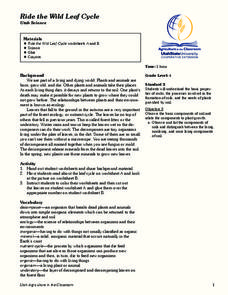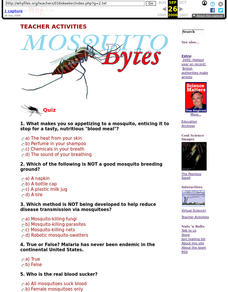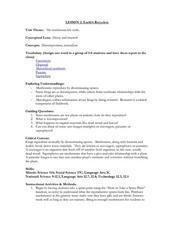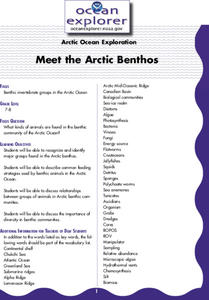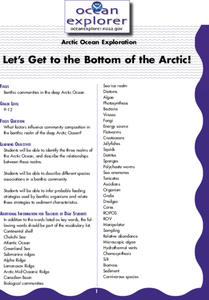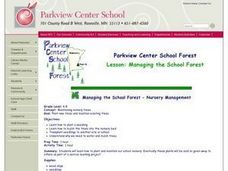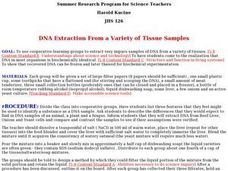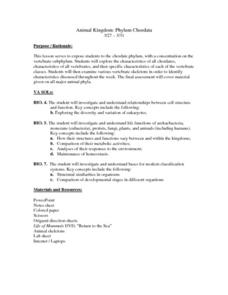Curated OER
Forest Floor Terrarium
Students study the aspects of a forest floor ecosystem, including decomposition, the water cycle, food webs, the needs of living things, and physical vs. chemical change over an extended period. In addition, students conduct observations...
Curated OER
What is in Soil?
Fourth graders identify and examine the components that make up soil. Individually, they use a magnifying glass to identify the organic and inorganic material in their soil sample. To end the lesson, they record the differences in the...
Curated OER
Food Chains
Students investigate the food chain. In this ecology lesson, students define producers and consumers. Students use organism cards to demonstrate how the food chain works.
Curated OER
Ride the Wild Leaf Cycle
Fourth graders complete a worksheet. In this life cycle activity, 4th graders learn about the leaf cycle and complete a worksheet where they put the leaf cycle steps in the correct order.
Curated OER
Don't Wait, Just Propagate
Students explore the process of growing plants from seed. In this propagation lesson, students examine methods of propagation and determine how to rapidly propagate plant species. Students listen to a lecture informing them on the topic...
Curated OER
Mosquitos
In this mosquitos worksheet, students answer multiple choice questions about mosquitos. Students answer 5 questions about mosquitos.
Curated OER
Obtaining Food -- The Impact of Over-fishing
Young scholars play a fishing game. In this food supply lesson students regulate their fishing in a game about over-fishing. The young scholars identify resources that could be extracted from that biome.
Curated OER
Microbes and Health
Sixth graders investigate microorganisms. In this Science instructional activity, 6th graders examine how microorganisms can be both positive and negative. Students list diseases caused by microorganisms.
Curated OER
Earth's Recyclers
Students work together in groups to report on different topics related to decomposition. They answer questions and share their answers with the class. They discuss any topic that is unclear.
Curated OER
MAPPING A RESEARCH SITE AND COLLECTING AND PRESENTING POPULATION DATA
Sixth graders are to answer research questions based on data they collect.
Curated OER
I Depend on You, You Depend on Me!
Students explore the interdependency between humans and the ecosystems. They examine how uncontrolled development threatens the rain forests. They discuss how human actions affect the rain forest.
Curated OER
Your Body: A Bacteria Incubator!
Young scholars demonstrate their comprehension of PREDICTING AND HYPOTHESIZING by... ¿¿¿ Predicting a logical outcome to a situation, using prior knowledge, experience and/or evidence. AND ¿¿¿ Explaining reasons for that...
Curated OER
Transmission of Disease
Students provide names of viral diseases that they would possibly like to be infected with today; listing them on the Smart Board. They then come to an agreement about what virus to use and use beakers of fluids to simulate how viruses...
Curated OER
Make Sense of Nature
Learners participate in this program that heightens their awareness and curiosity of nature as well as their sense of adventure and exploring new surroundings. They identify and choose an object from nature after exploring it with other...
Curated OER
Light My Fire ...Fly
High schoolers examine fire flies. They measure the frequency of light stimulus used by communicating fire flies. Students explore the concept of organisms using light to communicate. High schoolers film the fire flies and quantify...
Curated OER
Meet the Arctic Benthos
Learners recognize and identify major groups found in the Arctic benthos. They describe common feeding strategies used by benthic animals in the Arctic Ocean. They discuss relationships between
Curated OER
Let's Get to the Bottom of the Arctic!
Students identify the three realms of the Arctic Ocean, and describe the relationships between these realms. They describe different species associations in a benthic community.
Curated OER
PLANTING A TREE
Students study how to select the right tree for the right site, how to properly plant a tree, and how to mulch and water a tree.
Curated OER
MANAGING THE SCHOOL FOREST
Students study how to plant a seedling, how to mulch the trees into the nursery bed, transplant seedlings to another site or school, and determine why we need to water and mulch trees.
Curated OER
This Place is Going to the Dogs
Students study different breeds of dogs. They watch a video, "Extraordinary Dogs", about special dogs and how they are categorized according to their adaptations. Then they create a digital video that demonstrates the qualities of dogs...
Curated OER
DNA Extraction From a Variety of Tissue Samples
Students, working in cooperative groups, extract very impure samples of DNA from a number of tissue samples. They determine how the samples can be preserved and how they are similar.
Curated OER
Earthworms
Fifth graders research the earthworm and write a one paragraph report on its anatomy and habitat. They learn about worms and how to dissect them through Video Streaming and virtual dissections, along with actually dissect a worm as...
Curated OER
Animal Kingdom: Phylum Chordata
Students use a dichotomous key to classify various vertebrate jar speciments into classes. They examine the speciments for general characteristics of each class and fill in a corresponding chart and then complete a few final assessment...





